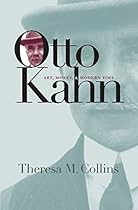Otto Kahn: Art, Money, and Modern Time

| Author | : | |
| Rating | : | 4.70 (714 Votes) |
| Asin | : | 0807826960 |
| Format Type | : | paperback |
| Number of Pages | : | 392 Pages |
| Publish Date | : | 2014-09-03 |
| Language | : | English |
DESCRIPTION:
Drawing on research in private correspondence, congressional testimony, and other sources, she paints a fascinating portrait of the figure whose seemingly incongruous identities as benefactor and banker inspired the New York Times to dub him the "Man of Velvet and Steel.". A partner at one of America's premier private banks, he played a leading role in reorganizing the U.S. This book is the full-scale biography Kahn has long deserved. The German-Jewish Kahn was also perhaps the most influential patron of the arts the nation has ever seen: he helped finance the Metropolitan Opera, brought the Ballets Russes to America, and bankrolled such promising young talent as poet Hart Crane, the Provincetown Players, and the editors of the Little Review. In the early decades of the twentieth century, almost everyone in modern theater, literature, or film knew of Otto Kahn (1867-1934), and those who read the financial press or followed the news from Wall Street could scarcely have missed his name. railroad system and supporting the Allied war effort in World War I. Theresa Collins chronicles Kahn's life and times and reveals his sin
"FROM THE PUBLISHER" according to A Customer. In the early decades of the twentieth century, almost everyone in modern theater, literature, or film knew of Otto Kahn (1867-19FROM THE PUBLISHER In the early decades of the twentieth century, almost everyone in modern theater, literature, or film knew of Otto Kahn (1867-193FROM THE PUBLISHER A Customer In the early decades of the twentieth century, almost everyone in modern theater, literature, or film knew of Otto Kahn (1867-1934), and those who read the financial press or followed the news from Wall Street could scarcely have missed his name. A partner at one of America's premier private banks, he played a leading role in reorganizing the U.S. railroad system and supporting the Allied war effort in World War I. The German-Jewish Kahn was also perhaps the most infl. ), and those who read the financial press or followed the news from Wall Street could scarcely have missed his name. A partner at one of America's premier private banks, he played a leading role in reorganizing the U.S. railroad system and supporting the Allied war effort in World War I. The German-Jewish Kahn was also perhaps the most infl. FROM THE PUBLISHER A Customer In the early decades of the twentieth century, almost everyone in modern theater, literature, or film knew of Otto Kahn (1867-1934), and those who read the financial press or followed the news from Wall Street could scarcely have missed his name. A partner at one of America's premier private banks, he played a leading role in reorganizing the U.S. railroad system and supporting the Allied war effort in World War I. The German-Jewish Kahn was also perhaps the most infl. ), and those who read the financial press or followed the news from Wall Street could scarcely have missed his name. A partner at one of America's premier private banks, he played a leading role in reorganizing the U.S. railroad system and supporting the Allied war effort in World War I. The German-Jewish Kahn was also perhaps the most infl. "From Opera News" according to A Customer. "Collins shows how [Kahn] gave away money nearly as quickly as he earned it, his contributions to music, literature, theater, dance, painting and design establishing New York City as an international cultural mecca. Essential details are expertly negotiated, and thornier questions on the reality of latent anti-Semitism among the heirs of the Gilded Age are explored in depth. As Collins aptly demonstrates, this 'self-made aristocrat' mastered the East without losing hi. A Customer said From Aufbau. "A considered and nuanced account of [the] early twentieth century American Medici. Collins' accomplished biographical study profiles from the cinematic deftness with which she crosscuts facets of Kahn's life, an altogether appropriate technique in limning an existence so enamored of and beholden to modernity. Her use of the language of theater and film in interpretive contexts seamlessly brings his many worlds into a unified vision."--Aufbau
Edison Papers. . Theresa M. Collins is a member of the research faculty at Rutgers University, where she teaches international history and serves as associate editor of the Thomas A
-- Martin Duberman, author of Paul Robeson. "This 'self-made aristocrat' mastered the East without losing his soul, and in the process, he ennobled the arts he loved." -- Opera NewsA superb piece of biography and a major work of historical reclamation
